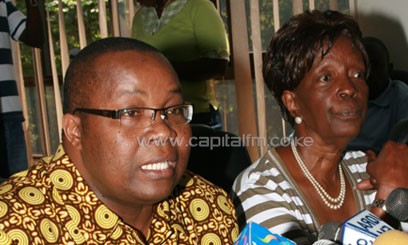
NCIC Chairman Mzalendo Kibunjia told Capital FM News that the 48, among them Cabinet Ministers, had already been served with cessation notices warning them of their tribal undertones/FILE
NCIC Chairman Mzalendo Kibunjia told Capital FM News that the 48, among them Cabinet Ministers, had already been served with cessation notices warning them of their tribal undertones.
Kibunjia however declined to name and shame the individuals saying the commission could not take such ‘drastic’ action before giving them a chance to tow the line.
“I’m sure you already know some of the names we have mentioned in the past. I do not want to tell you exactly who,” he insisted when asked to name the warmongers.
He added that the commission was in the process of analysing evidence against some of these individuals before calling for their prosecution.
Others will however get away with an apology.
The Kibunjia-led commission has always insisted on championing cohesion and helping hate speech culprits understand the importance of spreading peace. Some Kenyans however feel the commission should use its stick to discipline such individuals.
“We dispense some of these things by giving them notices; we also move some of the cases to the level of an apology or prosecution depending on the gravity of their statements,” he said.
The country has recently witnessed sprouting pockets of tribal violence, some driven by politicians, ahead of the forthcoming elections. Kibunjia also admitted that the wounds created by the post election violence were still raw for many Kenyans and that the tribal animosity that followed remained high.
“The one thing that causes violence is when you have politicians inciting this kind of flare ups and in fact this confirms what we have always been saying that reconciliation has not happened on the ground. We remain a very raw-nerve society,” he observed.
The Truth, Justice and Reconciliation Commission (TJRC) has been going round the country to investigate the events surrounding the post election violence alongside other historical injustices meted out on Kenyans including the Wagalla massacre.
However with about 100 days left to the general elections, the TJRC’s report is yet to see the light of day.
“The commission (TJRC), which was created to help us like each other and say nice things about each other, has not even published its report and has not even told us what we should do but that does not mean that we cannot coexist. It does not mean that we cannot live together,” argued Kibunjia.
Those seeking various elective posts including the top seat were also asked to speak out in one voice and spread the peace message.
Kibunjia warned Kenyans against allowing themselves to be polarised to the same level they were in at the height of the 2007 post poll chaos.
“Leaders must not play to the gallery because we must protect our country. All the presidential aspirants should come together and talk to Kenyans regarding peace and the importance of safeguarding it,” he said.









































